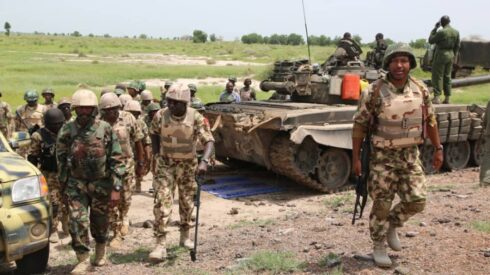A military base in Sabon Gari, located in the Damboa district of Borno State, was attacked in the early hours of Sunday by fighters linked to the Islamic State West Africa Province (ISWAP). The insurgents, arriving in trucks and on motorcycles, launched a coordinated offensive on the base, resulting in the tragic loss of six soldiers. According to military sources cited by AFP, the attackers also set fire to the base and destroyed several army vehicles during the raid.
The Defence Headquarters confirmed the assault through its spokesman, Major General Edward Buba, who acknowledged operational setbacks but refrained from disclosing specific casualty figures. “An inquiry has been set up to confirm the details of what transpired, after which I will provide the details in due course,” Buba stated.
Counter-Strike by Nigerian Air Force
Following the attack, the Nigerian Air Force swiftly deployed fighter jets from Maiduguri, the regional capital situated approximately 100 kilometers from the base. The aerial strikes targeted the retreating ISWAP fighters, leading to significant militant casualties. Operational vehicles and weaponry belonging to the insurgents were also reportedly destroyed in the counteroffensive.
Although the exact toll on the ISWAP fighters was not disclosed, a senior military officer described the air strikes as a critical effort to mitigate further threats in the region. The Defence Headquarters emphasized its commitment to combating insurgency despite the recent setbacks.
Ongoing Conflict in Northern Nigeria
The attack is a grim reminder of the persistent insecurity in northeastern Nigeria, which has been grappling with insurgency since 2009. ISWAP, a splinter faction of Boko Haram, has escalated its attacks in the region, targeting military bases and civilian populations alike. The 14-year conflict has claimed over 40,000 lives and displaced approximately two million people, leaving communities in a perpetual state of fear and uncertainty.
In November, a similar raid on a military base in Kareto village near the Niger border resulted in the deaths of five Nigerian soldiers and injuries to ten others. These incidents underscore the ongoing challenges faced by Nigerian forces in their efforts to stabilize the region.
Government and Military Response
The Nigerian government and military continue to adapt their strategies in response to the evolving tactics of jihadist groups. While air strikes have proven effective in neutralizing immediate threats, experts emphasize the need for comprehensive counterinsurgency measures that address the root causes of terrorism.
Major General Buba reassured Nigerians of the military’s resolve to protect the nation’s territorial integrity. “We are committed to securing the region and will leave no stone unturned in bringing the perpetrators of these heinous acts to justice,” he affirmed. Meanwhile, inquiries into the Sabon Gari attack are ongoing, with updates expected in the coming weeks.
The tragic loss of soldiers in Sabon Gari highlights the urgent need for sustained efforts to restore peace and stability in northeastern Nigeria.
Recent ISWAP Attacks and Rising Concerns
The Sabon Gari attack is not an isolated incident. In November, ISWAP fighters raided a military base in Kareto village near the Niger border, killing five soldiers and injuring ten others. Such brazen assaults reflect the group’s growing operational capability and its focus on destabilizing military presence in strategic areas.
The persistence of these attacks has sparked concerns about the effectiveness of counter-insurgency measures and the need for enhanced military strategies. As the conflict continues, the Nigerian military faces mounting pressure to address the security threats posed by ISWAP and other insurgent factions effectively.
This report emphasizes the urgent need for comprehensive counter-terrorism strategies to protect military personnel and civilians in the region while mitigating the humanitarian crisis caused by the ongoing insurgency by ISWAP and BOKO HARAM .
Community-Military Collaboration Essential for Stability
To counter ISWAP’s persistent aggression, security experts emphasize the importance of fostering strong synergy between local communities and the military. Building trust and collaboration with affected communities can aid intelligence gathering and enhance the military’s operational efficiency.
Restoring normalcy in northeastern Nigeria requires not only military action but also significant political and economic investment to rebuild infrastructure, provide education, and offer economic opportunities for displaced populations. Analysts stress that eradicating insurgency is essential for fostering long-term peace and accelerating development in the region.
This tragic attack is a stark reminder of the ongoing security challenges in Nigeria’s northeast, calling for immediate and coordinated action to end the cycle of violence and restore hope to affected communities.
Table of Contents
Discover more from OGM News NG
Subscribe to get the latest posts sent to your email.














